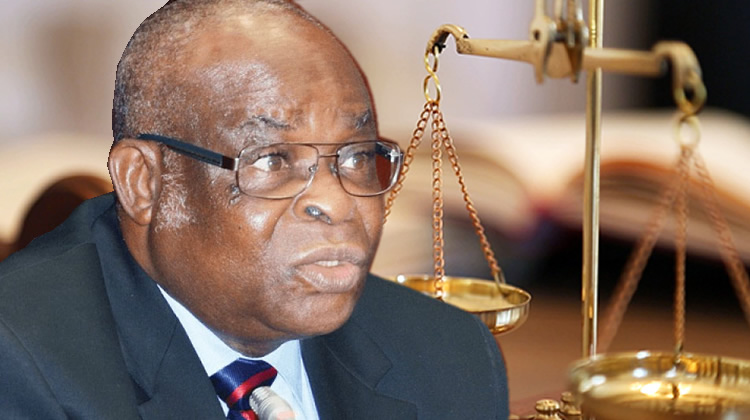More trouble awaits the suspended Chief Justice of Nigeria, CJN, Justice Walter Onnoghen, as the National Judicial Council, NJC, on Monday ordered him to respond to a fresh petition lodged against him by the Economic and Financial Crimes Commission, EFCC.
The Council, which took the decision at the end of its emergency meeting in Abuja, further constituted a Preliminary Complaints Assessment Committee, to consider responses of both Onnoghen and Justice Tanko Muhammad, the Acting CJN, to various petitions against them.
The NJC, in a statement signed by its Director of Information, Mr. Soji Oye, said it would reconvene on Wednesday to decide the fate of Justices Onnoghen and Muhammad.
Besides, the legal body expressed its confidence in the ability of Justice Umaru Abdullahi, the former President of the Court of Appeal, to retain his position as its interim Chairman.
It will be recalled that the Coalition of United Political Parties, CUPP, had on Sunday, raised concerns over Justice Abdullahi’s affinity with President Muhammadu Buhari.
The group said it was worried that Abdullahi who was President Buhari’s classmate, being the interim head of the NJC, may not objectively consider the petition against Onnoghen.
According to CUPP which claimed that it was in receipt of an interim resolution of the NJC that indicted Onnoghen and exonerated the Acting CJN of any wrongdoing, Justice Abdullahi, was the first person that defended President Buhari over the allegation that does not possess requisite educational qualifications.
Nevertheless, the NJC, at the end of its meeting, said it was satisfied with Justice Abdullahi’s interim leadership.
The statement read: “The National Judicial Council reconvened today in an Emergency Meeting to consider the responses of Hon. Mr. Justice W.S.N. Onnoghen, GCON and Hon. Mr. Justice I.T. Muhammad, CFR to the three petitions written against them.
“Members resolved to constitute into the Preliminary Complaints Assessment Committee in accordance with Regulation 17 of the National Judicial Council Judicial Discipline Regulations, 2017 and report to Council on the 13th of February 2019.
“The Council will reconvene on Wednesday, 13th February, 2019.
“Council also received a new petition written by the Economic and Financial Crimes Commission (EFCC) against Hon. Mr. Justice W.S.N. Onnoghen, GCON and forwarded it to him for his response within seven (7) working days.
“Council reaffirmed its confidence in Hon. Mr. Justice Umaru Abdullahi, CON and continues under his Interim Chairmanship”.
It will be recalled that the NJC had on January 29, directed Justice Onnoghen who was suspended from office on January 25 by President Buhari, to within seven days, respond to a petition that was lodged against him by one Zikhrillahi Ibrahim of Resource Centre for Human Rights & Civil Education.
Onnoghen was specifically asked to defend the allegation that he acquired funds and properties, way beyond his legitimate earnings.
Similarly, the NJC which is the organ of the judiciary responsible for the Appointment, Promotion and Discipline of Judicial Officers, also directed the Acting CJN, Justice Muhammad, to explain why disciplinary action should not be taken against him for submitting himself to be sworn-in by President Buhari, as Onnoghen’s replacement.
The Acting CJN, Justice Muhammad was asked to respond to two separate petitions entered against him by a group under the aegis of Centre for Justice and Peace Initiative, as well as by Chief Olisa Agbakoba, SAN, a former President of the Nigerian Bar Association, NBA.
Agbakoba had in his petition, urged the NJC to determine the propriety of Justice Muhammad, accepting to be sworn-in by the President in place of the suspended CJN, despite being aware of the implication of his conduct.
According to Agbakoba, by submitting himself to the President to be sworn-in as acting CJN, Justice Muhammad, lent himself to constitutional infraction by the executive arm of government.
He recalled that Justice Muhammad was a member of the panel that sanctioned Justice Obisike Orji of Abia State for allowing himself to be sworn-in as Abia State Chief Judge by the state’s governor, without recourse to the NJC.
Consequently, Agbakoba, accused the Acting CJN of engaging in an act of judicial misconduct.
However, Onnoghen, who is facing a six-count charge before the Code of Conduct Tribunal, CCT, had in his reply to the charge against him, insisted that he legitimately earned “huge funds” allegedly traced to five separate bank accounts that were linked to him.
Onnnoghen further justified series of deposits that were linked to the accounts, saying they were proceeds from his trade in foreign exchange (forex), AGRICODE, as well as proceeds of his investments.

